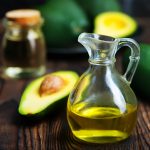 You have some new choices in the oil aisle of the grocery store, and some of them are definitely better and healthier than others. The good news is that there are some delicious oils now available (forget that old vegetable oil!) and they are healthy too.
You have some new choices in the oil aisle of the grocery store, and some of them are definitely better and healthier than others. The good news is that there are some delicious oils now available (forget that old vegetable oil!) and they are healthy too.
Here’s the scoop:
Avocado Oil
This is the new darling of the oil aisle, and thankfully is pushing coconut oil out of the spotlight. When I was in grad school we thought avocado oil would have a low smoke point, but research showed the smoke point of avocado oil is actually high. This means it doesn’t break down and burn at high temperatures, like when you are cooking on high heat. This is important because you don’t want your dishes to taste like burnt oil.

Avocado oil has many of the nutrients found in avocados, along with a rich, almost buttery flavor. It doesn’t have a strong avocado taste, and its a great choice to add some variety to your menu. Dressings made with avocado oil are delicious (try avocado oil and lime juice with a little cilantro) and its also good for cooking on the grill.
Olive Oil
Olive oil is still king of the kitchen. We have a lot of solid research on the health benefits of olive oil, and none of these other oils should take its place. However olive oil isn’t great at everything. Olive oil isn’t great at high heat, it can break down and turn bitter. It also has a distinct flavor, which is great in a marinara sauce but not so great in a blueberry muffin.
Choose olive oils from California (they tend to be fresher) or oils where the olives all come from the same place. Its always good if there is a pressing or packaging date on the bottle. Use it within one year of that date, and make sure the bottle is dark glass. Olive oil will spoil more quickly when exposed to light.
Coconut Oil
This has been trendy for a while, although the health benefits you see in ads have are mostly propaganda. Coconut oil is high in saturated fats, and from what we see so far it behaves similarly to other saturated fats like butter and beef fat. It has a high smoke point, and does have a subtle coconut flavor.
The coconut oil buzz started because the saturated fatty acids in coconut oil are shorter than those found in animal products, and are absorbed from the small intestine in a little different way. The theory is they could be more health-promoting than regular saturated fats. The research has been disappointing and I recommend using coconut oil sparingly as you would any saturated fat.
Interestingly, one of the places coconut oil shines best is in skin care. A salve of coconut oil mixed with a little turmeric powder soothes the dry, cracked skin that is often a side effect of chemotherapy.
Safflower Oil
This neutral-tasting oil has a high smoke point too, so its good for high heat cooking as well as baking. The type of fats found in safflower oil are beneficial to our health, so its a good choice. Its hard to say if its better than canola oil, because there isn’t any research comparing the two. Safflower oil is less processed, which is always a good thing.
Sunflower Oil
I like using sunflower oil for baking or cooking when I don’t want the flavor of olive oil. Its smoke point isn’t as high as avocado or sunflower oils, but its high enough for my home stove. The taste isn’t as neutral as safflower oil, but I don’t notice any sunflower taste in my cooking when I use it. Its less processed than many oils, and the price is reasonable.
Peanut Oil
Peanut oil has been around forever, and its what I used to use for deep frying and sometimes still use for stir-frying. It has a high smoke point and I like the slightly nutty taste. With the new oils out now its harder to find in the grocery store, but its still a good choice. Anyone with a peanut allergy will have a reaction to peanut oil.
Sesame Oil
Sesame oil is often used more as a condiment in Asian dishes than a cooking oil. You can buy toasted or plain, the toasted has more flavor and I find more recipes call for it. The plain or lighter colored sesame oil has a slightly higher smoke point than the toasted and can be used for quick cooking.
Specialty Nut Oils
These nut oils (like hazelnut, almond, etc) are delicious and richly flavored. If you love the nut, you will probably love the oil. The smoke point of these oils is low, they should not be used for cooking. They are wonderful as a flavorful drizzle on raw or cooked foods (grilled vegetables!) and make good salad dressings. These oils will spoil, so buy them in small jars and keep in the refrigerator to extend their shelf-life.
All oils will eventually become rancid, so please throw away any oils that have been in your pantry for over a year. Buy only what you will use within six months, and always throw away any oil that has turned color, has become cloudy at room temperature or has an off odor.
Quality oils will give a wonderful flavor to the food you cook. They can also be expensive. My philosophy is to spend money where it matters, and good quality oils give us a lot of value for our dollar. A good oil only needs a little lemon juice or vinegar to make a fantastic dressing or flavorful drizzle on a simple dish.
So, which is the best oil to choose? My recommendation is olive oil for most dressings and cooking, sunflower oil for baking and avocado oil for high heat cooking and when I want that flavor (like in taco salad), and one or two specialty oils for flavoring.
There is no reason to be afraid of healthy oils in reasonable amounts. They help us to feel full, give us the essential fatty acids we need each day, cool down inflammation, and actually help our hearts stay healthy.
Leave a Reply